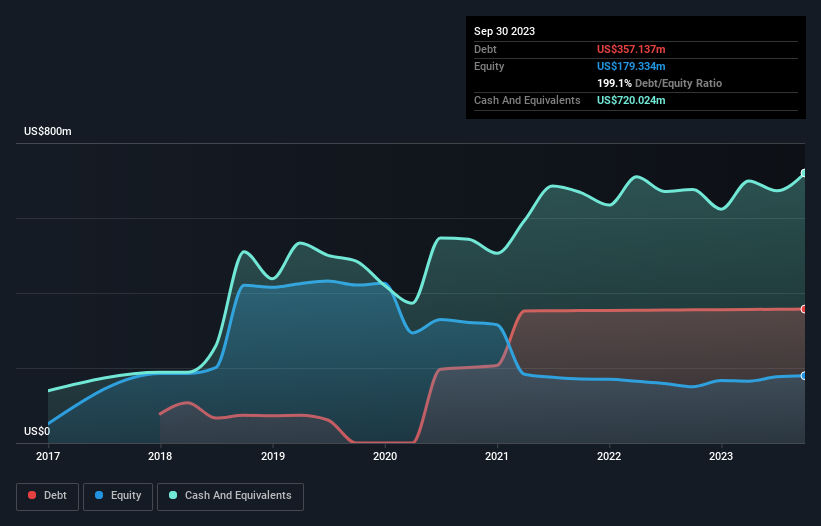Some say volatility, rather than debt, is the best way to think about risk as an investor, but Warren Buffett famously said that 'Volatility is far from synonymous with risk.' It's only natural to consider a company's balance sheet when you examine how risky it is, since debt is often involved when a business collapses. As with many other companies Eventbrite, Inc. (NYSE:EB) makes use of debt. But the more important question is: how much risk is that debt creating?
What Risk Does Debt Bring?
Debt assists a business until the business has trouble paying it off, either with new capital or with free cash flow. Ultimately, if the company can't fulfill its legal obligations to repay debt, shareholders could walk away with nothing. While that is not too common, we often do see indebted companies permanently diluting shareholders because lenders force them to raise capital at a distressed price. Having said that, the most common situation is where a company manages its debt reasonably well - and to its own advantage. The first thing to do when considering how much debt a business uses is to look at its cash and debt together.
View our latest analysis for Eventbrite
What Is Eventbrite's Debt?
As you can see below, Eventbrite had US$357.1m of debt, at September 2023, which is about the same as the year before. You can click the chart for greater detail. But on the other hand it also has US$720.0m in cash, leading to a US$362.9m net cash position.

How Strong Is Eventbrite's Balance Sheet?
According to the last reported balance sheet, Eventbrite had liabilities of US$425.4m due within 12 months, and liabilities of US$367.2m due beyond 12 months. Offsetting this, it had US$720.0m in cash and US$5.40m in receivables that were due within 12 months. So its liabilities total US$67.2m more than the combination of its cash and short-term receivables.
Since publicly traded Eventbrite shares are worth a total of US$829.1m, it seems unlikely that this level of liabilities would be a major threat. Having said that, it's clear that we should continue to monitor its balance sheet, lest it change for the worse. Despite its noteworthy liabilities, Eventbrite boasts net cash, so it's fair to say it does not have a heavy debt load! The balance sheet is clearly the area to focus on when you are analysing debt. But ultimately the future profitability of the business will decide if Eventbrite can strengthen its balance sheet over time. So if you want to see what the professionals think, you might find this free report on analyst profit forecasts to be interesting.
In the last year Eventbrite wasn't profitable at an EBIT level, but managed to grow its revenue by 24%, to US$310m. With any luck the company will be able to grow its way to profitability.
So How Risky Is Eventbrite?
While Eventbrite lost money on an earnings before interest and tax (EBIT) level, it actually generated positive free cash flow US$31m. So taking that on face value, and considering the net cash situation, we don't think that the stock is too risky in the near term. One positive is that Eventbrite is growing revenue apace, which makes it easier to sell a growth story and raise capital if need be. But we still think it's somewhat risky. For riskier companies like Eventbrite I always like to keep an eye on whether insiders are buying or selling. So click here if you want to find out for yourself.
If, after all that, you're more interested in a fast growing company with a rock-solid balance sheet, then check out our list of net cash growth stocks without delay.
Valuation is complex, but we're here to simplify it.
Discover if Eventbrite might be undervalued or overvalued with our detailed analysis, featuring fair value estimates, potential risks, dividends, insider trades, and its financial condition.
Access Free AnalysisHave feedback on this article? Concerned about the content? Get in touch with us directly. Alternatively, email editorial-team (at) simplywallst.com.
This article by Simply Wall St is general in nature. We provide commentary based on historical data and analyst forecasts only using an unbiased methodology and our articles are not intended to be financial advice. It does not constitute a recommendation to buy or sell any stock, and does not take account of your objectives, or your financial situation. We aim to bring you long-term focused analysis driven by fundamental data. Note that our analysis may not factor in the latest price-sensitive company announcements or qualitative material. Simply Wall St has no position in any stocks mentioned.
About NYSE:EB
Eventbrite
Operates a two-sided marketplace that provides self-service ticketing and marketing tools for event creators in the United States and internationally.
Undervalued with excellent balance sheet.
Similar Companies
Market Insights
Community Narratives



